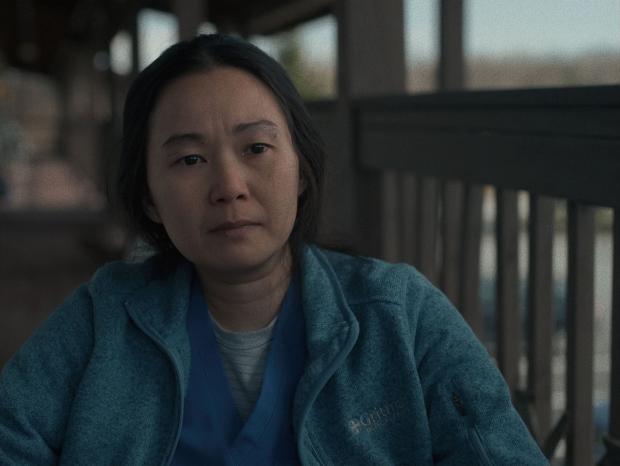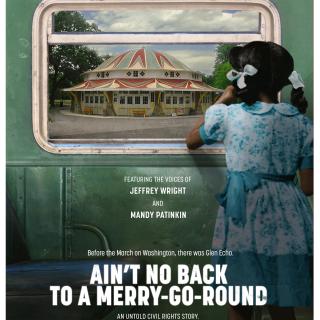Advertisement
"The Whale" is the story of Charlie (Brendan Fraser), a reclusive English teacher, living with severe obesity who attempts to reconnect with his estranged teenage daughter Ellie (Sadie Sink) for one last chance at redemption.
When we meet Charlie, he’s in a kind of literal and emotional limbo: physical because his size prevents him from moving very well; emotional because of the enormous roiling grief he has towards his dead partner, Alan. He's full of guilt over Alan’s passing, guilt over walking out on a life with his daughter, guilt over all the things that might have been.
Unable to forgive himself for his own role in Alan’s death and deeply guilty about his desertion of his young daughter and wife Mary (Samantha Morton), Charlie begins to self-destruct through compulsive binge-eating. Unprocessed grief is the ground floor of everything for Charlie. He’s suffering from congestive heart failure, but maybe he’s really dying of the grief he’s never reconciled.
As a high school teacher, Charlie would be intimately acquainted with how important it is – both in essays and in life – to have a clarity of vision: to defend one’s position, to omit the unnecessary fluff, to get to the heart of the matter as clearly and concisely as possible. It’s this belief system that undergirds Charlie’s desire to reconnect with the people in his life, to tie up loose threads in the anticipation of a strong concluding paragraph, in what he believes are his final days on earth.
Charlie's time is running out. As he makes a last bold attempt to reconcile with his broken family, he must confront with his full heart and fierce wit long-buried traumas and unspoken love that have haunted him for decades. His pursuit of the truth is what brings him back in contact with his estranged daughter, Ellie, who disguises her wounds from Charlie’s abandonment with the thick, dark armor of her rage. Initially, she rebukes any attempt on Charlie’s end to spend time together, only relenting when he agrees to help her write her school essays. As a teacher, the only way Charlie can even hope to connect with Ellie is through her Moby-Dick essay. Ellie spends most of the film absolutely determined to feel nothing for her father, not even pity. But over time, a part of her begins to enjoy their conversations, even if most of them consist of the worst insult she can think of, only to be frustrated when Charlie finds her with charming rather than hurtful. Ellie’s super-power has always been that she has a real ability to see into people and figure them out.
One of Charlie’s most complicated and moving visitors is Mary, his ex-wife. This is a woman who has loved Charlie and seen the absolute worst of him. He broke her heart, and she hates him for that, yet still harbors a lingering tenderness towards him. Seeing him in his current state, she vacillates between disgust, pity, terror, and affection. It's this transparency and energy that allows her to so expertly and immediately dismantle the tired resentful ex-wife.
Mary is a deeply complex character. Through Charlie, the film gives us access to a life that's rarely portrayed with tenderness or intelligence on the big screen. We see a kaleidoscope of Charlie’s inner world, all of its contradictions and longings and fears. This intimacy between audience and protagonist is the heart of the film, which takes place over five days in Charlie’s world as he seeks connection with various people in his life, an estranged daughter, an ex-wife, his best friend, his online students, and even the wide-eyed missionary at his front door. Through each of these encounters, a portrait of Charlie’s life comes into focus, and the heartbreaking severity of his situation becomes clear.
What began as a one-bedroom apartment becomes a battleground, where past, present, and uncertain future converge and combat. Charlie breaks down his own borderlines. He has been in a spiral ever since the death of his partner, but now, he has come through weariness to a palpable optimism that lights up these urgent days. At the story’s climax, Charlie asks the story’s most profound question: “Do you ever get the feeling that people are incapable of not caring?”
Like many people in crisis, Charlie is full of contradictory impulses. Even though he knows he’s dying, even though he actively rejects medical care that could save his life or ease his pain, he's still exquisitely alive to and in awe of the wonders of the world. He has an undeniable zeal for life, even as he essentially condemns himself to death in slow motion. All the hope Charlie has left, especially for his seemingly misanthropic daughter Ellie, is rooted in this most human of qualities. For if his convictions about empathy are true, anything is possible for Ellie. In the five days we spend with Charlie, we witness his attempt to reconnect with the daughter he left as a toddler and who now wants nothing to do with him.
Now seventeen years old, Ellie is a razor-tongued, whip-smart, pent-up ball of absolute fury who prides herself on not needing anyone and who lashes out, even violently, to anyone who attempts to get close to her. Her mother thinks she might be irredeemably evil. Charlie is convinced she’s brilliant, and that her cutting insight will become something special as long as she doesn’t follow his path of hiding his pain. Charlie is convinced that Ellie will be the proof positive of his verdict that no one is incapable of caring. He's a very flawed person, but he understands the power of imagination. He believes that if you take the time, anyone might imagine, and maybe even understand, someone else’s world. It's a character who truly lives in gray tones the way people do, and who've extremely rich, intricate inner lives. They’ve all made mistakes, but what they share are immense hearts and the desire to love even when others are seemingly unlovable. It’s a story that asks another simple but essential question: “Can we save each other?” That feels important in the world right now, especially when people seem more than ever to be turning their backs on one another. It reminds us that all the promise of love and redemption is there in every human existence.
In the stage version, the piece ends on a hard cut to black. In the film, we see Charlie take a step towards the light. It’s a heightened moment, maybe even fantastical. Rain comes, but on the last day, the sun is out, so when the door opens, the light is shooting down onto Charlie. When you make a big choice like that, you’ve just got to throw everything you've at it and hope you’ve done enough that the audience comes with you. The cutting patterns and shot choices of the two scenes are very similar. We know Charlie is facing the end. "The Whale" offers a lot of darkness. It’s a soaring character study of a man wrestling with the enormity of his regret, the duty of fatherhood, and the feasibility of goodness itself. It's a story about transformation and transcendence, one man’s odyssey into himself and out of his body, a journey through the depths of grief towards the possibility of salvation.
The film is based on the play by Samuel D. Hunter. Any concern about the possible insensitivity of the title is quickly dispelled as well, once it's understood that Moby Dick factored prominently into the show, both literally and thematically. Charlie and Ahab are not so unlike, underneath it all, both men caught up in the pursuit of a dream, intoxicated with the could-have-been, obsessed with the fantasy of another future. In some ways, "The Whale" is a hunt, a search to grasp the slippery nature of compassion, why we need it and why we push it away, when we can give it and when we can’t. But the audience also experience the thrill of it blooming in the course of the story’s construction. In the midst of re-examining trust, and it's boundaries.
And while there are many causes of obesity, a multifactorial disease affecting over 40% of Americans, the film draws a direct link in this case between excess weight and unaddressed feelings. Myths about obesity abound. Despite being an extremely common disease, it’s also highly individual in its make-up, with aspects of genetic, metabolic, environmental, and psychological dimensions all contributing to the way it affects a person. Three million people are diagnosed with obesity every year, and yet the stigma against it remains rampant. This is reflected in the lack of honest representation of people with obesity in film and TV, and even more so when it comes to leading characters.
Opens Tue 20 Dec, AMC DINE-IN Easton Town Center 30
4:00 pm 7:00 pm 9:45 pm
https://www.fandango.com/amc-dine-in-easton-town-center-30-aanit/theater-page?date=2022-12-20
Opens Wed, Dec 21, Gateway Film Center, 7:15pm
https://gatewayfilmcenter.org/movies/the-whale-2022/







